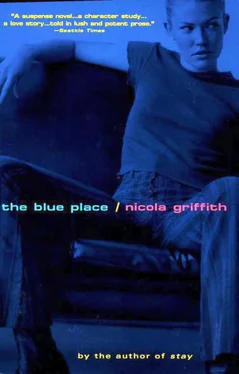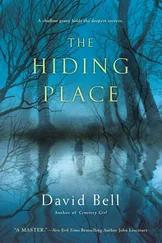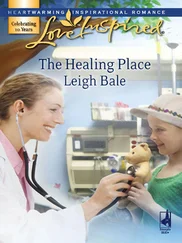“Almost.”
“Why won’t she wake up? She just lies there and there’s no sound but that beep beep beep of the machines.”
“It’s her body’s way of focusing its attention on what’s necessary. She’s fighting to stay alive the best way she knows how. When she regains strength, she’ll wake up.”
“You’re sure?”
“Absolutely. You know Julia, she can’t bear to miss anything that’s going on.”
She started to smile, but the stretch turned into a quiver. “I can’t do this.”
“You’re tired. I bet you didn’t sleep on the plane. Julia doesn’t sleep on the plane, either. A few hours’ rest will work wonders.”
“But I have to see to her things. Insurance. Her clothes. Make arrangements.”
“Hjørdis, my aunt, is already dealing with getting our things from the seter—the farm where we’ve been staying. Everything is being taken care of. And Julia is safe now. She’s in good hands. Get some sleep, Mrs. Miclasz.”
“Annie.” A ghost of the former roguish smile, gone in a moment. “You saved her life.” I should never have let her go. “You love her, don’t you?”
My hawk with broken wings and matted feathers. “Yes.”
“So do I. If we join forces, she’ll have to live.”
“She’ll live.” She had to.
“The doctors tell me you were hurt, too.”
Cracked scapula, chipped elbow, nerve damage. Infections had meant they had snipped away bits of skin and muscle; I had had a blood transfusion; and there were enough stitches to make my arm look like that of a child’s clumsily sewn-up teddy bear.
“Nothing that won’t mend.”
She stood. “When I come back tomorrow I’ll bring some vitamins. I want you to get well quickly. Julia is going to need us both.”
A nurse brought in a phone. It was my mother.
“Hjørdis has told me what you told her happened.” A diplomat’s nicety of language. “I take it your trip to England will be postponed?”
“Yes. I’ve chartered an air ambulance and will accompany Julia and her mother to Atlanta tomorrow. They’ve found a donor they can keep alive until we get there.”
“Will she survive the operation?”
“The odds are about even.”
“Keep me informed. And if you need anything, anything at all, call.”
I held Julia’s hand all the way across the North Sea, across the Irish Sea and the Atlantic Ocean, even though this was one flight during which she would not be afraid. When I had to release a hand to let the nurse be about his business, I rested my palm against her thigh. Somewhere deep down in her crocodile brain I wanted to register the fact that she was not alone, that she never would be.
Annie sat on the other side of the bed. Sometimes she held her hand, too; mostly, she just looked.
Over the Irish Sea, the plane lurched a little.
“I hate turbulence,” she said.
“It must be genetic.”
“You should be resting that shoulder.”
“I’m fine.”
The plane droned through the arid reaches of the afternoon sky.
“She’s lovely, isn’t she?”
“Yes.”
“She’s too young, too beautiful to die.”
“I won’t let her die.”
“I saw it from the beginning, you know.”
“Saw what?”
“That you two were right for each other. She was so upset about Jim’s death, all to pieces. It was quite unlike her. I haven’t seen her like that before, well, not since…”
“She told me about her brother.”
“Oh. Well, I couldn’t understand it, why she fell apart like that. Almost as if she was blaming herself. And then you came along, out of the blue, and suddenly she wasn’t in pieces anymore.” She smiled. “Did she ever tell you she thought you’d done it at first?”
“The police told me.”
“She went to the police about you?” She shot Julia a startled glance.
“It probably seemed like a good idea at the time. He was her friend. I was there when it happened. But the police didn’t take her seriously.”
“Well, I’m glad she didn’t get you into any trouble.”
Any trouble. Any trouble. I wanted to laugh, but did not know if it would escape as a howl.
Annie said softly, “But what am I saying? I’m not a fool. The Norwegian police don’t really believe your story about two men attacking each other and Julia getting shot by mistake.”
“Do you?”
The engine note climbed as the pilot tried to find his way out of the turbulence.
“I’ll believe that rather than believe Julia might have been at fault somehow.” Her face was set and so pale that the blusher seemed almost garish, the kind of work mortuary beauticians do.
“Julia was simply at the wrong place at the wrong time. No, not just in Oslo. It started in Atlanta.”
“When Jim died.”
“Before then.” I told her what I knew, up to breaking into Honeycutt’s house and taking information to Denneny. She didn’t need to know about that, or my deal with the cartels. But as she had said, she was not a fool.
“So you killed them. No, don’t say anything. I’m glad. If I thought asking you to kill a hundred times would keep Julia safe, I’d ask you to do it.”
And I would. A hundred times. A thousand times.
“But we don’t need to worry about that now, do we? The Atlanta police will take it from here. They called, you know, while you were away. They have some new evidence. They wanted to talk to Julia again. I told them she was in Oslo, consulting with Olsen Glass.”
“What did they say?”
“They wanted the name of the person she would be seeing. I gave them Edvard’s number. He came to the hospital, you know.”
I nodded. He had visited me, too.
“He was so young, and he seemed to take Julia’s injury personally—kept apologizing on behalf of his country. I didn’t know what to say, so I just hugged him until he shut up. He cried. I had to mop up his tears. At least it gave me something to do, something that made a difference.”
We both looked at Julia lying still and silent and beyond our care. The engines resumed their steady hum. We were above the turbulence.
“That sculpture garden he and Julia were planning, are planning, sounds lovely. All those story characters and settings for the children. The adult version sounded challenging and exciting, too, but I think it was the children’s garden he really wanted. Wants. Oh, god, Aud, I’m talking about her and the garden in past tense.”
We landed just before six in the evening, Atlanta time. The air was thick and hot and flavoured with diesel fumes. The ambulance drove to Piedmont Hospital along streets crowded with convertibles full of tanned people in shorts and pastel polo shirts, eyes blank and anonymous behind shades. The trees were heavy and green with full summer foliage, the sky an impersonal, bland blue. I insisted that the EMTs give Julia a second blanket; the air-conditioning was fierce. By seven, she was being prepped for surgery.
The surgeon came to talk to us in the visitors’ suite before he scrubbed. “The operation will take several hours, and you won’t be allowed to see her for hours after that, but I don’t suppose there’s any point telling you to go home and get some sleep? No. Well, I’ll call in again after the operation and let you know how it went.”
I pulled two armchairs together for Annie, and two for myself, and found us both blankets. We curled up. When I woke at two in the morning, Annie was staring at the ceiling.
“Would you like some coffee?”
“May as well,” she said.
Hospitals at night are strange places. The floors gleam in the dark and the air is too dry and hot. In a few hours, gurneys trundled by hospital porters spiriting away those who had died in the night would squeak down these corridors, past doors behind which frightened people lay awake, listening. I passed a vending machine on the way to the nurse’s station, but ignored it.
Читать дальше












